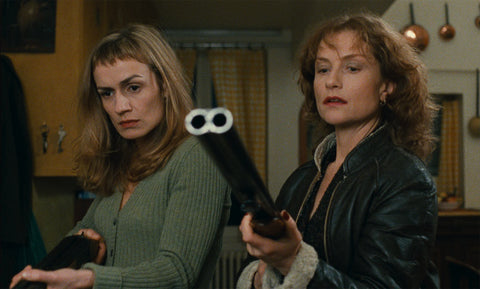CLAUDE CHABROL
"Feminine suspense in 5 films"
Hell , The Ceremony , Nothing is going right ,
Thank you for the chocolate , La Fleur du mal
by Antoine DeBaecque
Claude Chabrol spoke of his deep interest in women as a filmmaker. "The woman is more interesting than the man," he confided. A woman in her daily life becomes a real subject. And a strange, criminal, mysterious woman becomes THE subject. The filmmaker's project, during the last twenty years of his life and his last sixteen films – eleven of which are centered primarily on one or more female characters – consists in making these women circulate between their daily world and exceptional situations, in order to make them oscillate, as he says, between “a real subject” and “THE subject”.
In the five films of this volume, there are some points in common: three are played by Isabelle Huppert, entering directly into the corpus of the seven Chabrolian “Huppert's films”; three are films of female criminals, another major genre in Chabrol's system, which includes eight opuses; finally, all are based on a suspense: an unsolved mystery which the film proposes, in one way or another, the resolution. Suspense fabricated from scratch by unhealthy jealousy in L'Enfer , by the class struggle around the issue of illiteracy in La Cérémonie , by the contents of a strange briefcase in Rien ne va plus , by poisoning and the bewitchment of music in Merci pour le chocolat , and by the return of family secrets in La Fleur du mal .

Chabrol does not only accompany a societal evolution by giving more space to women in his films, he chooses, more profoundly, to feminize his cinema. He surrounds himself with women to work, scriptwriters, technicians, actresses. It also concerns the way of watching his characters evolve in their social, family, sentimental context, and the very way of filming, staging and telling a story – feminine suspense. Here is a fruitful vein: the feminine part of Chabrol's work, with women as central figures, often victims and sometimes criminals.
Antoine de Baecque is a film historian and critic. He directed the Cahiers du cinema and the cultural pages of Liberation . Author of numerous works on history and cinema, in particular biographies of Truffaut, Godard, Rohmer, Melville, and essays: La Nouvelle Vague, portrait d'une jeunesse or L'Histoire-caméra . He is a professor of film studies at the Ecole Normale Supérieure in rue d'Ulm and is currently completing a biography of Claude Chabrol (Stock).AND SINGLE EDITIONS


